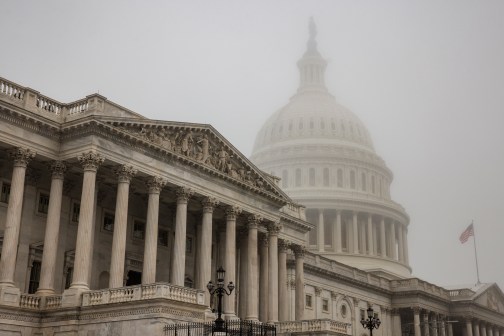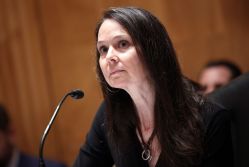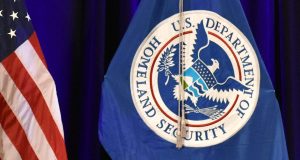 The 9/11 Commission. From left to right (top row) Richard Ben-Veniste, John Lehman, Timothy Roemer, James Thompson, Bob Kerrey, Slade Gorton. (Bottom row) Fred Fielding, Lee Hamilton, Thomas Kean, Jamie Gorelick.
The 9/11 Commission. From left to right (top row) Richard Ben-Veniste, John Lehman, Timothy Roemer, James Thompson, Bob Kerrey, Slade Gorton. (Bottom row) Fred Fielding, Lee Hamilton, Thomas Kean, Jamie Gorelick.A decade after the 9/11 Commission issued its final report on the Sept. 11, 2001, terrorist attacks against the United States, the threat from global terrorism may be more pronounced than ever, with major new vulnerabilities emerging in cyberspace and a congressional homeland security oversight system plagued by duplication and turf battles.
Members of the National Commission on Terrorist Attacks Upon the United States, led by former New Jersey Gov. Thomas Kean and former Indiana Democratic Rep. Lee Hamilton, reconvened as private citizens Tuesday — a decade after completing their work — to reflect on the nation’s progress acting upon the commission’s recommendations and to discuss new threats that pose significant challenges in the post-9/11 era.
“Many Americans think that the terrorist threat is waning—that, as a country, we can begin turning back to other concerns. They are wrong,” the commission wrote in a new 46-page report analyzing the current state of homeland security. “On issue after issue — the resurgence and transformation of al Qaeda, Syria, the cyber threat — public awareness lags behind official Washington’s. If this gap persists, the political support for needed national security capabilities will fade.”
Director of National Intelligence James Clapper echoed that conclusion. “The terrorist threat to the United States is still very, very real,” Clapper said, speaking at an event hosted by the Bipartisan Policy Center focusing on the tenth anniversary of the 9/11 Commission report. “It is spreading globally and morphing into more and more so-called franchises.”
But in addition to a more dangerous, geographically dispersed and morphing terrorist threat, the nation faces a growing number of vulnerabilities in cyberspace, the latest report states.
“Every current and recent-former official with whom we spoke described the cyber threat in urgent terms,” the report states. “Yet public awareness is lagging far behind official awareness. If the American people hear this message, they will be willing to support the measures needed to counter cyber threats.”
“As a nation…we are accepting more risk than we were three years ago or even one year ago,” Clapper said, referring to what he called a “perfect storm” of budget cuts, information leaks and damaged international relationships that make information sharing, especially on cybersecurity issues, more difficult.
But there is hope, according to Clapper. The intelligence community workforce hired since Sept. 11, 2001, think differently about information sharing and are, for the first time, being equipped with the cyber tools needed to make information sharing and data security a reality. “They look upon integration as a reality. They come to us integration-minded,” Clapper said. He thanked the 9/11 Commission for recommendations that made IT integration a priority for intelligence reform.
“For the first time ever, [the Intelligence Community IT Enterprise] will integrate in a single IT enterprise the entire IC,” Clapper said. “This will take integration to the next level. It will both promote integration and security. The bumper sticker is tag the data, tag the people,” he said, referring to the need to tighten insider security in the wake of massive leaks by former National Security Agency contractor Edward Snowden.
The more difficult issue facing the Department of Homeland Security, however, is a problem it has faced since its inception. There are 92 committees and subcommittees in Congress with oversight roles and responsibilities for DHS — a major problem that formed one of the key recommendations of the original 9/11 report.
“Do something with regard to the massive, inefficient, ineffective oversight procedures dealing with the Department of Homeland Security,” former Secretary of Homeland Security Tom Ridge said. “I can think of only one reason [for this problem’s continued existence] and it’s about turf.”
The need to reform congressional oversight of DHS is absolutely “imperative to maximize the efficiency and effectiveness of this department,” Ridge said. “If you want to make America more secure, one of the most important things you can do is…change your oversight and change your committee structure. It is a national security issue.” Follow @DanielVerton







